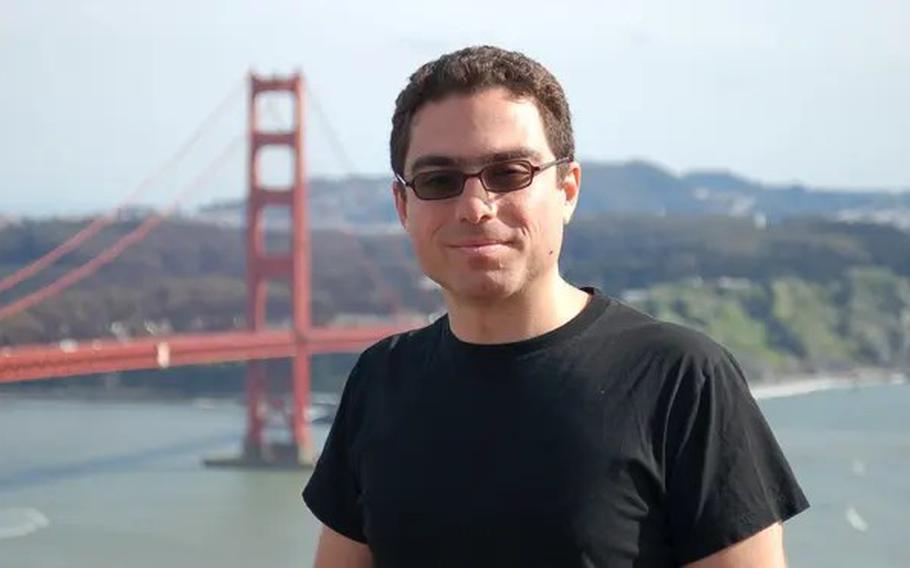
Siamak Namazi, an Iranian American jailed in Iran for nearly seven years on widely discredited espionage charges was temporarily released Saturday, October, 1, 2022. (Facebook)
An Iranian American jailed in Iran for nearly seven years on widely discredited espionage charges was temporarily released Saturday while Iran also lifted a travel ban on his ailing father, who had been imprisoned after traveling to the country to plead for his son's release.
Siamak Namazi, 51, and Baquer Namazi, 85, are among a growing list of U.S. and European nationals who have been held by Iran as political pawns, according to western officials.
Tehran claimed Saturday that following the Namazis' release Washington would unfreeze $7 billion in Iranian assets held in South Korea due to U.S. sanctions.
"With the finalization of negotiations between Iran and the United States to release the prisoners of both countries, $7 billion of Iran's blocked resources will be released," State News Agency IRNA said Sunday.
A U.S. State Department spokesperson denied that any assets would be transferred as part of a deal. The spokesperson, unnamed per State Department protocol, told The Washington Post that Washington was still working to secure the full release of Siamak Namazi, as well as several other U.S. nationals jailed in Iran.
"We remain committed and determined to securing the freedom of all Americans unjustly detained in Iran and elsewhere," State Department spokesperson Ned Price said in a statement Saturday.
Price also thanked "U.S. allies and partners who have worked tirelessly to help the Namazis, including the U.N. Secretary General, Switzerland, Qatar, the United Arab Emirates, Oman and the United Kingdom."
Iranian media reported Saturday that an unnamed "regional country" helped to facilitate the deal.
An informed source, who was not authorized to speak publicly on the matter, told The Post that Iraq had a key role in mediating between Iran and U.S. and British counterparts.
Washington and Tehran cut off diplomatic relations shortly after the 1979 revolution that brought Iran's ruling clerics to power.
But the two countries have most recently been engaged in now stalled indirect talks to revive the 2015 Iranian nuclear deal that Washington left in 2018. Iran has billions of assets frozen in banks around the world due to western sanctions. A return to the deal would include U.S. sanctions relief needed to revive Iran's collapsed economy.
Reports by state-affiliated media in Iran emphasized that the release of the Namazis has coincided with the lack of progress around the nuclear deal.
The younger Namazi, a businessman, was arrested in 2015 while visiting Iran and has been held in the notorious Evin prison. An Iranian court convicted him in 2016 of espionage charges, which he denied.
Namazi's furlough is for one week, during which he will stay with his family, Jared Genser, the family lawyer, told Reuters. It remains unclear if the furlough will be extended.
The elder Namazi, a former U.N. official, traveled to Iran in 2016 to plead for his son's release. He was subsequently detained and convicted of "collaboration with a hostile government." Authorities furloughed him from prison in 2018 due to health conditions and closed his case in 2020, though he remained under a travel ban.
"The Secretary-General is grateful that, following his appeals to the president of the Islamic Republic of Iran, our former colleague Baquer Namazi has been permitted to leave Iran for medical treatment abroad," a spokesperson for U.N. Secretary General António Guterres said Saturday in a statement.
"This is a critical first step but of course we will not rest until the entire family is able to return to the United States and their long nightmare is finally over," Genser, the family lawyer, told Reuters.
Former political prisoners have described being subject to abuse, torture and forced confessions of such offenses as spying , while in prison.
Iran has falsely blamed "foreign enemies" for fomenting more than two weeks of nationwide anti-government protests sparked last month by the death of a young woman, Mahsa Amini, while in police custody. Authorities said Friday that they arrested nine European nationals for their role in the protests in a move likely to increase tensions with the west.
U.S., European and U.N. officials have condemned Iran's crackdown on demonstrators, which has included using live fire and cutting off internet access. At least 52 protesters have been killed, and hundreds more injured and arrested, according to London-based Amnesty International.
The demonstrations, which have pulled people from a cross-section of ethnic, geographic and class groups, are the biggest surge of unrest since a wave of protests in 2019 triggered by economic grievances.
In a separate case, Venezuela, another U.S. adversary, said Saturday that it had freed seven Americans held for nearly five years. The detainees, who included five oil company executives, were exchanged for two nephews of President Nicolás Maduro's wife jailed in the United States for drug smuggling.
The Washington Post's John Hudson contributed reporting from Washington; Mustafa Salim contributed reporting from Baghdad.